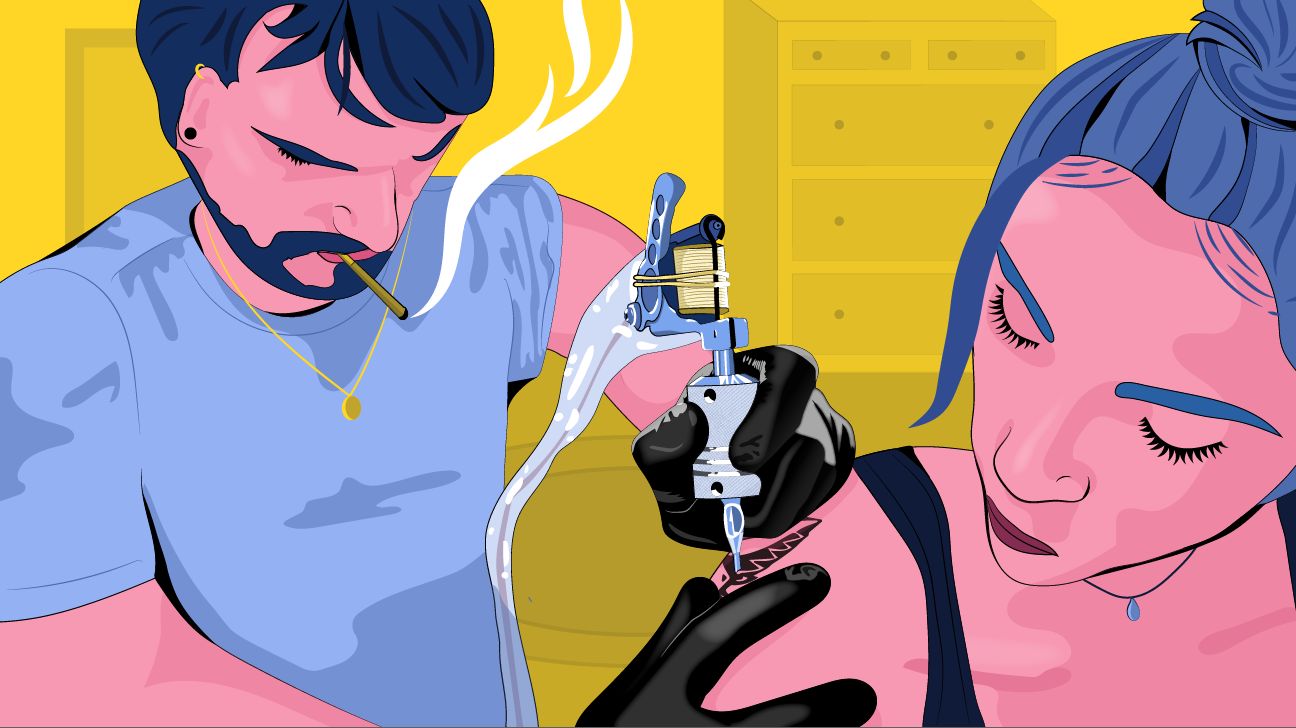When a tattoo artist on Tinder asked if he could tattoo me, I figured why not? I’d just relocated back to my fatherland, Uruguay, and had been saving real estate on my body (I already had 24 tattoos) for representations of my patria, a Spanish term that is used to mean pride of one’s country.
I provided artistic direction for three tattoos but didn’t ask about his experience or his tattoo parlor before the tattoo date. Major mistake.
When I arrived at his house, I immediately started to wonder what I was doing there and if I was putting myself in danger. When he led me into his bedroom and told me he was self-taught and learned by tattooing his thighs a few months ago, I knew I should leave. But my dedication to seeing things through persevered over a lurking sense of fear.

As he started to work, I became increasingly on edge. Not only did he smoke cigarettes while he worked, but he also took a few hits off a joint. When I asked him to stop, on account of my asthma, he barely acknowledged me. It’s legal to smoke cannabis in Uruguay — something I thoroughly enjoy — but I wasn’t too keen on having someone permanently modify my body while stoned.
In the middle of the second tattoo he said something that set off all my alarm bells.
“I got into tattooing because I love hurting people,” he said full deadpan as he dragged a needle across my ribcage. At this comment, I started to seriously question his psyche — and the situation I’d gotten myself into. It was clear he felt justified putting a woman in a position of fear while permanently marking her body.
As soon as he finished the second tattoo, I hopped out of the chair, paid him what he was owed, and left without explanation.
I’ve always had a strong sense of spontaneity. I’m fearless to a fault, and will do almost anything for a good story, something I attribute to being a survivor of multiple instances of sexual assault.
Having a history of traumatic experiences drives me to have a devil-may-care attitude, especially in situations with men like this one.
“Traumatic events can lead to a complex change in the way someone makes decisions such as inadvertently engaging in reckless actions that lead to high-risk situations,” Dr. Suzanna Chen, psychiatrist, says. “Survivors may act strong or brave to try to somehow unconsciously attempt to repair what happened and get rid of feeling powerless.”
Unfortunately, my desire to prove my strength often leads me to put myself in harm’s way, a dangerous catch-22.
“Risk takers tend to have a lack of self-control and self-worth,” says Babita Spinelli, licensed Psychotherapist. “Recklessness focuses on short-term satisfaction. It prevents us from looking at the bigger picture.”
What sets this experience apart from past mistakes is that I did finally find the nerve to cut things short and get myself to safety. The disturbing verbal and physical cues the tattoo artist was giving me were just too much to ignore. Ultimately, my sense of security did prevail over my impulse to see things through.
Spinelli says it takes strength to leave in the middle of a situation you intentionally participated in. “We can become so caught up in a situation that often it’s hard to get off the hamster wheel. We may also fear consequences if we leave,” she adds.
It’s been 6 months since the tattoo date and I don’t have regrets about the tattoos. He etched a laurel (an herb featured on Uruguayan coins and a staple in our cuisine) onto the nape of my neck and the Uruguayan country moto, Libertad o Muerte (liberty or death) on the side of my chest. This phrase has deep significance to me — nothing matters to me more than my freedom.
Although, the irony isn’t lost on me that I put myself in a potentially deadly scenario to get these words permanently inked on my body.
If there’s one thing this night taught me, it’s to think more critically about the situations I put myself in to begin with. If I think I need to see something through it means I realize it isn’t something I should be doing at all.
“By not giving in to the desire to be reckless, we’re protecting ourselves from making a decision that could be detrimental,” says Spinelli.
It’s an ongoing challenge, but I’m trying to be better about weighing the possible negative outcomes of a situation before moving forward with a decision that may be reckless. I now see the strength of saying no in situations that spark my interest but are ultimately not wise for my safety.
Lola Méndez is an Uruguayan-American freelance journalist who writes about sustainability, travel, culture, social justice, and more. You can follow her on Instagram and Twitter @LolaAnnaMendez and read her responsible travel blog, MissFilatelista.com.
